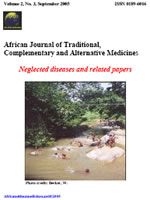
|
African Journal of Traditional, Complementary and Alternative Medicines
African Ethnomedicines Network
ISSN: 0189-6016
Vol. 14, No. 4, 2017, pp. 140-148
|
 Bioline Code: tc17123
Bioline Code: tc17123
Full paper language: English
Document type: Research Article
Document available free of charge
|
|
|
African Journal of Traditional, Complementary and Alternative Medicines, Vol. 14, No. 4, 2017, pp. 140-148
| en |
PROTECTIVE EFFECT OF IRIS GERMANICA  L. IN Β-AMYLOID-INDUCED ANIMAL MODEL OF ALZHEIMER’S DISEASE L. IN Β-AMYLOID-INDUCED ANIMAL MODEL OF ALZHEIMER’S DISEASE
Borhani, Mona; Sharifzadeh, Mohammad; Farzaei, Mohammad Hosein; Narimani, Zahra; Sabbaghziarani, Fatemeh; Gholami, Mahdi & Rahimi, Roja
Abstract
Background: Alzheimer's disease (AD) is the most common cause of dementia that is an irretrievable chronic
neurodegenerative disease. In the current study, we have examined the therapeutic effects of Iris germanica extract on
Amyloid β (Aβ) induced memory impairment.
Materials and Methods: Wistar rats were divided into five groups of 8 per each. Groups were as followed: control
group which were normal rats without induction of AD, Aβ group which received Aβ (50 ng/side), iris 100 group
which received Aβ + Iris (100 mg/kg), iris 200 group which received Aβ + Iris (200 mg/kg), and iris 400 group which
received Aβ + Iris (400 mg/kg). AD was established by intrahippocampal injection of 50 ng/μl/side Aβ1-42. The day
after surgery, animals in treatment groups received different doses of the aqueous extract of Iris by gavage for 30 days.
Morris water maze test (MWM) was performed to assess the effects of I. germanica on learning and memory of rats
with Aβ induced AD.
Results: Data from MWM tests, including escape latency and traveled distance, demonstrated that I. germanica extract
could markedly improve spatial memory in comparison to control. Moreover, the plant had a significantly better effect
on the performance of AD rats in the probe test.
Conclusion: I. germanica extract can successfully reverse spatial learning dysfunction in an experimental model of
AD. Further neuro psyco-pharmacological studies are mandatory to reveal the mechanism of action of this natural
remedy in the management of AD symptoms.
Keywords
Alzheimer's disease; Iris germanica; spatial learning; escape latency; traveled distance; beta amyloid; common flag; traditional Persian medicine
|
| |
© Copyright 2017 - African Journal of Traditional, Complementary and Alternative Medicines
Alternative site location: http://journals.sfu.ca/africanem/index.php/ajtcam
|
|
